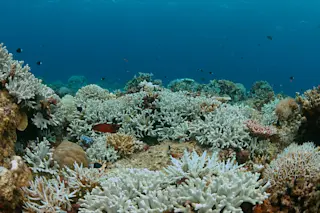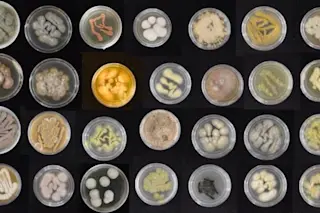It’s been said time and time again that climate change is killing coral reefs. Rising ocean temperatures cause bleaching, which damages huge chunks of coral ecosystems from Australia to the southern United States.
But heat isn’t the only reason reefs are dying. Nitrogen runoff from human activities could be damaging corals around the world.
Over the course of three decades, researchers from Florida Atlantic University collected nutrient samples in the Looe Key, a protected reef in South Florida. They found that rising nitrogen levels made it harder for corals to resist bleaching in hot temperatures, leading them to be more susceptible to warming oceans.
And the cause of this increase? Humans, most likely.
All Signs Point to N
The increases in nitrogen also came at the same time that phosphorus levels, an essential nutrient for coral growth, were decreasing.
Phosphorus is good for corals, while too much nitrogen is damaging. But water samples from the 30 year study showed nitrogen levels in the Keys were rising and phosphorus levels were falling, upsetting a delicate balance. And several other factors convinced researchers that the presence — and absence — of these compounds was not a mere coincidence.
Researcher Brian LaPointe, a marine scientist from Florida Atlantic Univeristy, says there are several human factors that could play a major role. Nitrogen is a major component in commercial fertilizers and it’s also found in sewage, both of which often end up leaching into waterways. When nitrogen gets into waterways, it eventually flows to the ocean, where it could be causing problems.
A boom in tourism in big cities like Orlando and Miami, as well as population growth throughout Florida over the past 30 years, may have made these factors worse. The state’s population nearly doubled over the course of the study, from 11 to almost 20 million.
‘That’s a lot of toilets flushing,” LaPointe says. “By the time that water gets down in the Everglades, the nitrogen to phosphorus ratio is like 260/1.”
The imbalance between helpful nutrients and harmful chemicals results in corals that are even more stressed out, and therefore more vulnerable to warming oceans. It all adds up to corals that bleach, or kick out their life-giving algae companions, more easily.
The research was published this week in the Journal of Marine Biology.
Save the Reefs?
LaPointe says there is a lot we could do to stop the spread of human-generated nitrogen, but the Keys’ future is uncertain.
At this rate, he’s not sure if even the most robust plans to clean up the water would save corals from continuing to die. But he’s still optimistic – by knowing how nitrogen and other nutrients impact reefs, scientists and policymakers across the world may be able to look for solutions in other areas before it’s too late.
“We’ve pretty much lost our reefs at this point and they’re not coming back,” LaPointe says. But by understanding that there are multiple factors at play when it comes to coral death, others may be able to take action before it’s too late.














